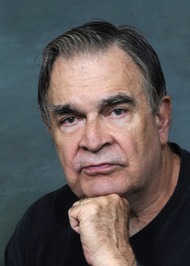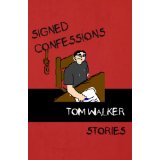Thanks for sitting down with me today, Tom. 
In reading the various “about you” information that I could locate, you seem to have led a very interesting life. You mentioned in your bio that you’re a native of San Antonio. I also noted that you currently reside there. What is it about this particular place that brought you back and/or keeps you there?
To coin a phrase, home is where the heart is. I was born and reared in San Antonio. When I was a kid, I couldn’t wait to get out of here. But in the Yankee cities I moved to – New York and Boston – I missed the polite manners and warm climate and biculturalism and Mexican food and fried chicken. I also missed my friends and relatives and other loved ones. Thomas Wolfe wrote “You Can’t Go Home Again,” but he was wrong. I could and I did.
I imagine that as a child, San Antonio was much different then, than it is today. Could you give us a glimpse of San Antonio through your eyes as a child? 
When I was a child, San Antonio was an overgrown town. It is now a big city. I used to be able to walk downtown from my house and everybody took the bus when they didn’t feel like driving. Emerson said that for everything that is given, something is taken, and I guess that applies here. The transformation has had pros AND cons. A character in one of my short stories (“Going Down with the Ship”) says of San Antonio, “In its push to become a city, it had lost its charm and grown too big for its britches.” I don’t agree totally, but I do somewhat. One thing that has not changed is the retired military mentality here because of all the bases. That’s something I wish had changed but never will. San Antonio still calls itself “Military City.”
In reading through your blog, I took stock of the fact that you have been writing for many, many years. Where did your love of writing originate from? Was there one particular moment, or has writing always been a lifelong love?
I started writing when I was four years old. I was an only child in a big house with lots of grownups and I had few playmates. Someone gave me a blackboard – the kind that folds up like a TV tray – and some chalk for Christmas, and I used to compose serials and comic strips on my blackboard. Since then I have never wanted to be anything other than a writer. I had no talent for anything else anyway.
Most people I have interviewed write only books whereas you began with short stories/magazine features. How did that come about? And I’m curious, how different is the writing of a short story versus a book? Which do you enjoy more?
I wrote short stories in college for my creative writing courses at UT-Austin and enjoyed it. I then tried to write novels but nobody would publish them. I did not start writing for magazines until the Seventies, when two counterculturalists started up a city magazine here. Short stories are easier to write because you can see the whole story in your head before you begin. It’s a sprint, like running the 100-yard dash. Whereas novels are more like marathon runs, lasting many miles, and you don’t always know where you’re going. Novels are sheer hell to write.
In the year 2000, you wrote your first book: Banking on Tradition. What prompted this “130-year history of the Frost National Bank?” Can you share a little bit about this book with our readers? 
I wrote the bank history in 2000 because I had gotten very interested in the city’s history. The Frost Bank history began just after the Civil War. My book chronicles the history of San Antonio along with that of the Frost Bank. The reason I wrote it was, I had been the editor of the city magazine (SA: The Magazine of San Antonio) and the big shots at the bank thought I could do a better job than anyone else who was a native San Antonian. They were right.
 You recently published another title, Signed Confessions in 2012. How did this book come to fruition? Were these stories originally written just for fun? As magazine articles that never made it to print? Or, had you been aspiring to write a book that would allow you to showcase a different aspect of your writing talents?
You recently published another title, Signed Confessions in 2012. How did this book come to fruition? Were these stories originally written just for fun? As magazine articles that never made it to print? Or, had you been aspiring to write a book that would allow you to showcase a different aspect of your writing talents?
The stories in Signed Confessions were written over a 20-year period starting in 1993. I wrote the first one, “Blessed Are They That Mourn,” for a San Antonio writer’s club I’d joined. The other stories came to me at random, one at a time, over the years. I had no plan to collect them in a book. But after I had written the seventh and final one, I realized how many themes had recurred throughout and decided to make a collection of the stories. It all came together serendipitously.
What do you do in your “off” time when you’re not writing?
I am an old dude now and live a pretty dull life. In my “off” time I read, follow sports (baseball, Spurs basketball, pro football), listen to music (classical and country western), go to movies, and watch TV. I watch a lot more TV than I used to because lately what I see on TV is better written than what I see up on the big screen in theaters. Continuing week-to-week shows like “The Sopranos” and “Six Feet Under” and “Homeland” and “House of Cards” are better written than the movies in the theaters. I look forward to them as I did Saturday afternoon serials when I was a kid.
From this point in your life, where do you hope to go with your writing? More magazine features and short stories, or is there another book in the works? If there is another book can you share anything about it?
I hope to continue writing until the day I die. There is no happier person than a writer who has totally submerged himself in working on a story or novel or play or book of poems or whatever. There is no more miserable person than a writer who is not writing anything. I am now working on a novel, even though the three novels I wrote between 1976 and 1996 never got published. The new novel is called A Day In the Life, after a Beatles song, and it’s in the absurdist CATCH-22 mode. That’s all I can say about it now.
With as much knowledge, and experience, as you possess in the industry, are there any words of wisdom you can pass on to our readers and/or aspiring authors?
To aspiring and wannabe writers, I would advise the following. Write! The more you write, the better you will write. Establish a regimen and stick to it. Go to the same place every day at the same time and see to it that you are not interrupted. Don’t be discouraged by rejection slips. CATCH-22, which I consider one of the greatest novels of the Twentieth Century, was rejected by 24 publishers before someone would take a chance on it.
And finally, as our interview comes to a close, is there a humorous experience or anecdote of yours that you would like to share?
Humorous experience? When I was trying to find an agent and a publisher for Signed Confessions, I kept hearing this: “Nobody will publish a collection of short stories unless the writer has already published one.” That sounded to me like something crazy out of Catch-22. It was like hearing “You can’t get a job unless you’ve already had a job.” Then how does anyone ever get his or her FIRST job? And how does anyone publish his or her FIRST book of short stories? When I asked the agents and publishers these questions, they just laughed at me as if I were crazy. And by then I was going crazy, thanks to them. You have to keep a sense of humor in this profession or you will go bananas.
Tom, thanks for giving us a peek into your life; it’s been a pleasure!